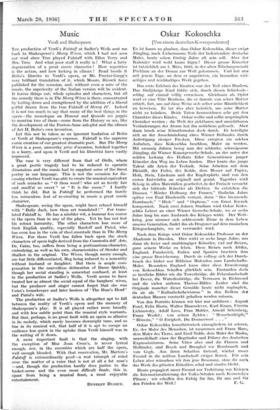Music
Verdi and Shakespeare THE production of Verdi's Falstaff at Sadler's Wells sent me back to Shakespeare's Merry Wives, which I had not seen nor read since Tree played Falstaff with Ellen Terry and Mrs. Tree. And what poor stuff it really is ! What a fatty degeneration of a great comic character ! How repetitive is the action, and how lacking in climax Read beside it Boito's libretto to Verdi's opera, or Mr. Procter-Gregg's very brilliant translation of it, which Messrs. Rieordi have published for the occasion, and, without even a note of the music, the superiority of the Italian version will be evident. It leaves things out, whole episodes and characters, but all the comedy there is in The Merry Wives is there, concentrated by boiling down and strengthened by the addition of a liberal potful drawn from the true Falstaff. of Henry IV. Indeed it is not too much to say that many of the best things in the
opera—the monologue on Honour and Quando ero paggio to mention two of them—come from the History or are, like the development of the Fenton-Anne sub-plot and the climax of Act H, Boito's own invention.
Let this not be taken as an ignorant laudation of Boito or Verdi at Shakespeare's expense. Falstaff is the supreme comic creation of our greatest dramatic poet. But The Merry Wives is a poor, unworthy pike d'occasion, botched together in a hurry, and upon it Verdi and his librettist have vastly improved.
The case is very different from that of Otello, where a great poetic tragedy had to be reduced to operatic dimensions and the music had to supplant some of the finest poetry in our language. This is not the occasion for dis- cussing whether Verdi was able to create the musical equivalent of such miracles as " 0 thou weed I who art so lovely fair and smell'st so sweet " or " It is the cause." I hardly think he did. But in Falstaff he performed the barely less miraculous feat of re-creating in music a great comic character.
Shakespeare, seeing the opera, might have echoed himself with " Bully Jack, how thou art translated " For trans- lated Falstaff is. He has a nimbler wit, a humour less coarse in the opera than in any of the plays. Yet he has not lost his robust humanity. The other characters lose more of their English quality, especially Bardolf and Pistol, who has even less in the vein of rhodomontade than in The Merry Wires. For them Verdi has fallen back upon the stock characters of opera buffa derived from the Commedia dell' Arte. Dr. Caius, too, suffers from being a portmanteau-character, embodying, as well as his own, characteristics of Slender and Shallow in the original. The Wives, though merry enough, are but little differentiated, Meg being reduced to a nonentity without husband or daughter. But there is ample com- pensation in the marvellous delineation of Dame Quickly, though her social standing is somewhat confused, at least in the production at Sadler's Wells. Verdi seems to have treated her as almost the social equal of the burghers' wives, but the producer and singer cannot forget that she was Caius's housekeeper and later hostess of ` The Boar's Head' and Pistol's wife.
The production at Sadler's Wells is altogether apt to fall between the reality of Verdi's opera and the memory of Shakespeare's play. It is all played rather more broadly and with less subtle point than the musical style warrants. But that, perhaps, is no great fault with an opera so allusive in its melody, which rarely becomes downright tune, and so fine in its musical wit, that half of it is apt to escape an audience less quick in the uptake than Verdi himself was in the writing of it down.
A more important fault is that the singing, with
the exception of Miss Joan Cross's, is never lyrical enough, nor, in the ensembles which are half the opera, well enough blended. With that reservation, Mr. Matters's Falstaff is extraordinarily good—a real triumph of mind over the matter of a voice that is not at all a fat man's —and, though the production hardly does justice to the basket-scene and the even more difficult finale, this is, apart from being a musical feast, a most enjoyable entertainment.
DYNELEY HUSSEY.


































































 Previous page
Previous page